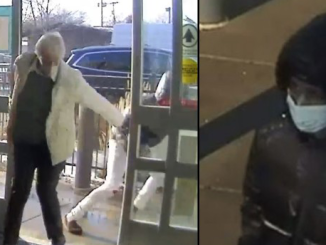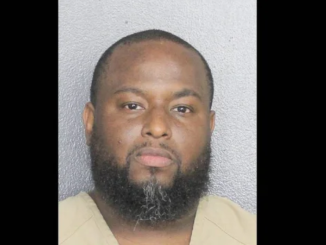
Smiley Allen Martin, the second man arrested in the wake of Sunday’s mass shooting in Sacramento that killed six, has a criminal record stretching to 2013 and last year was the subject of a plea by Sacramento County District Attorney Anne Marie Schubert’s office that he not win early release from prison, where he was serving a 10-year sentence for domestic violence and assault with great bodily injury.
Despite a two-page letter to the Board of Parole Hearings urging that Martin remain in custody, he won his release and was in Sacramento on Saturday night recording himself on a Facebook Live video brandishing a handgun hours before the shooting.
On Tuesday, Sacramento police arrested Martin, 27, at a hospital after he was injured in the shooting. He faces charges of possession of a machine gun and possession of a firearm by a prohibited person. A law enforcement source confirmed the machine gun is a handgun that was found at the scene Sunday that had been converted to be capable of firing as an automatic weapon.
His brother, Dandrae Martin, 26, was arrested Monday as the first person taken into custody in connection with the shooting, and is due in court Tuesday afternoon on charges of assault with a firearm and possession of a firearm by a prohibited person.
Law enforcement officials believe a gunfight broke out as a dispute between multiple shooters near 10th and K streets at 2 a.m. Sunday as downtown bars were closing, and authorities have not disclosed details of either man’s involvement in the events.
But documents obtained by The Sacramento Bee show the DA’s office last year vehemently opposed Smiley Martin’s release from the 10-year prison sentence he received in Sacramento Superior Court on Jan. 12, 2018.
“Inmate Martin’s criminal conduct is violent and lengthy,” Deputy District Attorney Danielle Abildgaard wrote in a two-page letter to the Board of Parole Hearings on April 29, 2021, opposing his release.
The letter, obtained by The Bee through a California Public Records Act request, details offenses including robbery, possession of a firearm and giving false information to police.
“In January of 2013, just six months after his eighteenth birthday, Inmate Martin was contacted by law enforcement officers,” the letter states. “Inmate Martin attempted to discard an assault rifle which he had concealed in his waistband under his clothing.
“The rifle had a pistol grip and the capacity to accept a detachable magazine in front of the pistol grip. Inmate Martin was also found to be in possession of two fully loaded twenty-five round magazines for the assault weapon. Inmate Martin admitted to transporting the assault weapon and large capacity magazines to potential buyers. Inmate Martin was sentenced to probation and county jail.”
Ten months later, Martin and three others walked into a Walmart store and pushed a clerk aside in the electronics department, then fled with several Galaxy Notebooks worth $2,800, the letter states.
“Video surveillance captured the incident,” the letter states. “During the investigation, law enforcement discovered additional robberies committed on November 29, 2013, and November 30, 2013, of similar electronics at other Walmart and Target stores. Witnesses positively identified Inmate Martin through surveillance photos at those subsequent robberies.
“Inmate Martin pled to the robbery and was sentenced to two years in state prison.”
After his release from prison, Martin came to the attention of authorities again in November 2016, when he was stopped in a vehicle with three other passengers and asked for his name and date of birth. Martin gave the officers a phony name and ran when officers told him they were going to detain him, the letter states.
“After a foot pursuit Inmate Martin was eventually incapacitated with a Taser and ultimately taken into custody,” the letter says. “Officers were able to identify him and learned he was a parolee at large.”
Less than six months later, he was involved in the incident that led to the 10-year prison sentence, the letter says, when he forced his way into his girlfriend’s home.
“He located her hiding in her bedroom closet and hit her repeatedly with a closed fist on the face, head, and body, causing visible injuries,” the letter says. “He then dragged her out of the home by her hair to an awaiting car. After he put her in the car, he assaulted her with a belt.
“During the investigation, information was gathered that the victim had been working as a prostitute and that Inmate Martin had been assisting and encouraging her to be a prostitute. Text messages and social media conversations revealed that he would tell her what kind of sex buyer she should date, how much money to charge, how to accept payment, and what forms of payment she should accept.”
California corrections spokeswoman Dana Simas said Tuesday afternoon that the parole board denied Martin parole in May 2021 but ended up being released less than a year later.
“Prior to reaching a CDCR facility, Martin had already received 508 days of pre-sentencing credits, and received a variety of additional post-sentencing credits,” she wrote in an email. “He was released to Sacramento County probation in February 2022.”
The letter to the parole board came as Schubert’s office and 44 other DAs were preparing to sue the California Department of Corrections and Rehabilitation over policies that they say would result in the “early release” of 76,000 inmates statewide.
“As shown by Inmate Martin’s pattern of conduct, he is an assaultive and non-compliant individual and has absolutely no regard for his victims who are left in the wake of numerous serious offenses,” Schubert’s office wrote last April. “He has no respect for others, for law enforcement or for the law.
“If he is released early, he will continue to break the law.”
Prison officials dispute the characterization that its rule changes amount to “early releases,” arguing that changes they made in how good conduct credits are applied do not amount to such a policy.
But Schubert, who is now running for state attorney general as an independent, sued over the fact that CDCR implemented the changes as “emergency” regulations without public input, and prison officials subsequently opened a public comment period that ends on April 13.
* story by The Sacramento Bee


